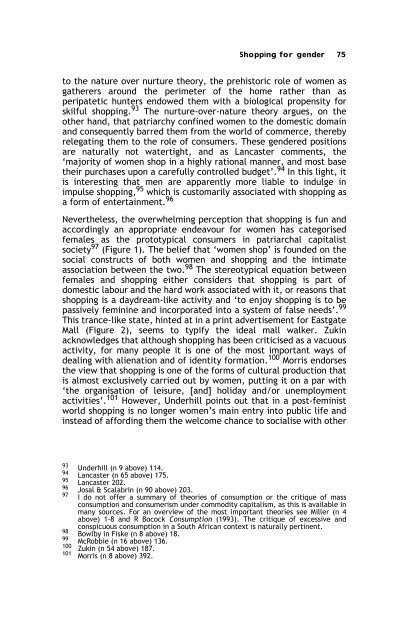Sex, Gender, Becoming - PULP
Sex, Gender, Becoming - PULP
Sex, Gender, Becoming - PULP
You also want an ePaper? Increase the reach of your titles
YUMPU automatically turns print PDFs into web optimized ePapers that Google loves.
Shopping for gender 75<br />
to the nature over nurture theory, the prehistoric role of women as<br />
gatherers around the perimeter of the home rather than as<br />
peripatetic hunters endowed them with a biological propensity for<br />
skilful shopping. 93 The nurture-over-nature theory argues, on the<br />
other hand, that patriarchy confined women to the domestic domain<br />
and consequently barred them from the world of commerce, thereby<br />
relegating them to the role of consumers. These gendered positions<br />
are naturally not watertight, and as Lancaster comments, the<br />
‘majority of women shop in a highly rational manner, and most base<br />
their purchases upon a carefully controlled budget’. 94 In this light, it<br />
is interesting that men are apparently more liable to indulge in<br />
impulse shopping, 95 which is customarily associated with shopping as<br />
a form of entertainment. 96<br />
Nevertheless, the overwhelming perception that shopping is fun and<br />
accordingly an appropriate endeavour for women has categorised<br />
females as the prototypical consumers in patriarchal capitalist<br />
society 97 (Figure 1). The belief that ‘women shop’ is founded on the<br />
social constructs of both women and shopping and the intimate<br />
association between the two. 98 The stereotypical equation between<br />
females and shopping either considers that shopping is part of<br />
domestic labour and the hard work associated with it, or reasons that<br />
shopping is a daydream-like activity and ‘to enjoy shopping is to be<br />
passively feminine and incorporated into a system of false needs’. 99<br />
This trance-like state, hinted at in a print advertisement for Eastgate<br />
Mall (Figure 2), seems to typify the ideal mall walker. Zukin<br />
acknowledges that although shopping has been criticised as a vacuous<br />
activity, for many people it is one of the most important ways of<br />
dealing with alienation and of identity formation. 100 Morris endorses<br />
the view that shopping is one of the forms of cultural production that<br />
is almost exclusively carried out by women, putting it on a par with<br />
‘the organisation of leisure, [and] holiday and/or unemployment<br />
activities’. 101 However, Underhill points out that in a post-feminist<br />
world shopping is no longer women’s main entry into public life and<br />
instead of affording them the welcome chance to socialise with other<br />
93 Underhill (n 9 above) 114.<br />
94 Lancaster (n 65 above) 175.<br />
95<br />
Lancaster 202.<br />
96 Josal & Scalabrin (n 90 above) 203.<br />
97 I do not offer a summary of theories of consumption or the critique of mass<br />
consumption and consumerism under commodity capitalism, as this is available in<br />
many sources. For an overview of the most important theories see Miller (n 4<br />
above) 1-8 and R Bocock Consumption (1993). The critique of excessive and<br />
conspicuous consumption in a South African context is naturally pertinent.<br />
98 Bowlby in Fiske (n 8 above) 18.<br />
99 McRobbie (n 16 above) 136.<br />
100<br />
Zukin (n 54 above) 187.<br />
101 Morris (n 8 above) 392.
















